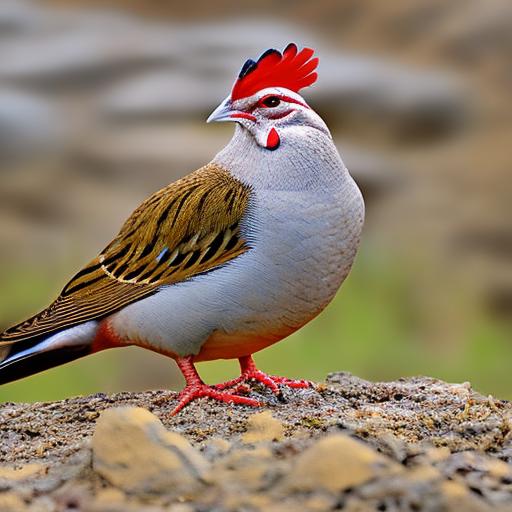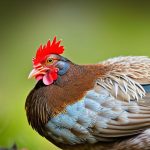Chukar and chickens are both popular domesticated birds that are often kept for various purposes. Chukar, also known as the Chukar partridge, is a small game bird native to Eurasia. It is known for its distinctive plumage and is often hunted for sport or kept as a pet. Chickens, on the other hand, are domesticated birds that are primarily raised for their meat and eggs.
While Chukar and chickens may seem like an unlikely pairing, some people consider keeping them together for various reasons. One reason is that they can provide companionship to each other. Chickens are social animals and thrive in the presence of other birds. By keeping Chukar and chickens together, they can form a flock and provide each other with company and stimulation.
Another reason why people consider keeping Chukar and chickens together is that they can benefit from each other’s presence. Chukar are known for their ability to forage for food in the wild, and by keeping them with chickens, they can help control pests in the chicken coop. Chickens, on the other hand, are known for their ability to scratch the ground and create dust baths, which can help keep the coop clean and free from parasites.
Key Takeaways
- Chukar and chickens can be kept together, but it requires careful consideration and management.
- Understanding the behavior of both species is crucial to successful cohabitation.
- Factors such as space, diet, and health should be taken into account before keeping them together.
- Adequate housing and feeding arrangements are necessary for both species to thrive.
- Potential issues such as aggression and disease transmission should be monitored and addressed promptly.
Pros and Cons of Keeping Chukar and Chickens Together
There are several advantages to keeping Chukar and chickens together. One advantage is that they can provide companionship to each other. Chickens are social animals and thrive in the presence of other birds. By keeping Chukar and chickens together, they can form a flock and provide each other with company and stimulation.
Another advantage is that they can benefit from each other’s presence. Chukar are known for their ability to forage for food in the wild, and by keeping them with chickens, they can help control pests in the chicken coop. Chickens, on the other hand, are known for their ability to scratch the ground and create dust baths, which can help keep the coop clean and free from parasites.
However, there are also some disadvantages to keeping Chukar and chickens together. One disadvantage is that they have different dietary needs. Chukar are primarily seed eaters, while chickens require a balanced diet that includes grains, vegetables, and protein. It can be challenging to provide both birds with the appropriate food without compromising their nutritional needs.
Another disadvantage is that they have different behaviors and temperaments. Chukar are more flighty and tend to be more independent, while chickens are more docile and social. This difference in behavior can lead to conflicts and aggression between the two species if not managed properly.
Understanding the Behavior of Chukar and Chickens
Chukar and chickens have different behaviors and temperaments. Chukar are more flighty and tend to be more independent. They are known for their ability to fly long distances and prefer open spaces. Chickens, on the other hand, are more docile and social. They are known for their ability to scratch the ground and create dust baths.
When kept together, Chukar and chickens may interact with each other in various ways. Chickens may try to establish a pecking order within the flock, which can lead to aggression towards the Chukar. It is important to monitor their interactions closely and intervene if any bullying or aggression occurs.
Chukar may also try to establish their own territory within the coop or enclosure. They may prefer higher perches or secluded areas where they can retreat to when they feel threatened. Providing enough space and hiding spots for both species can help minimize conflicts between them.
Factors to Consider Before Keeping Chukar and Chickens Together
Before deciding to keep Chukar and chickens together, there are several factors that need to be considered. One important factor is the climate and environment. Chukar are native to Eurasia and are adapted to a wide range of climates, including hot and dry environments. Chickens, on the other hand, are more sensitive to extreme temperatures and require shelter and protection from the elements.
Another factor to consider is the space requirements for both species. Chukar require more space compared to chickens due to their flighty nature. They need enough room to fly and exercise their wings. Chickens, on the other hand, require enough space to roam and scratch the ground.
Compatibility of breeds is also an important factor to consider. Some chicken breeds may be more aggressive towards other bird species, while others may be more tolerant. It is important to choose chicken breeds that are known for their docile nature when keeping them with Chukar.
Housing Requirements for Chukar and Chickens
When keeping Chukar and chickens together, it is important to provide suitable housing for both species. The housing should be secure and provide protection from predators and the elements.
For Chukar, a spacious aviary or flight pen is ideal. The enclosure should have high walls or a roof to prevent them from escaping. It should also have perches or elevated areas where they can roost and feel safe.
For chickens, a chicken coop with nesting boxes and roosting bars is essential. The coop should be well-ventilated and provide enough space for the chickens to move around comfortably. It should also have a secure door or fencing to keep predators out.
It is important to ensure that both species have access to clean water and food at all times. Waterers and feeders should be placed in separate areas to prevent competition and aggression between the birds.
Feeding and Watering Needs of Chukar and Chickens

Chukar and chickens have different dietary needs, so it is important to provide them with appropriate food and water. Chukar are primarily seed eaters and require a diet that is high in protein. They can be fed a commercial game bird feed or a mix of seeds, grains, and insects.
Chickens, on the other hand, require a balanced diet that includes grains, vegetables, and protein. They can be fed a commercial chicken feed or a mix of grains, vegetables, and kitchen scraps. It is important to provide them with enough calcium for egg production by offering oyster shells or crushed eggshells.
Both Chukar and chickens require access to clean water at all times. Waterers should be placed in separate areas to prevent competition and aggression between the birds. It is important to regularly clean and refill the waterers to ensure that the birds have access to fresh water.
Health Considerations for Chukar and Chickens
When keeping Chukar and chickens together, it is important to be aware of common health issues that can affect both species. Chukar are susceptible to respiratory diseases such as avian influenza and Newcastle disease. Chickens, on the other hand, are prone to diseases such as coccidiosis and Marek’s disease.
To prevent the spread of diseases, it is important to practice good biosecurity measures. This includes keeping the coop clean and free from feces, regularly disinfecting feeders and waterers, and quarantining new birds before introducing them to the flock.
It is also important to provide regular veterinary care for both Chukar and chickens. This includes vaccinations, deworming, and regular health checks. Any signs of illness should be addressed promptly to prevent the spread of disease within the flock.
Managing Interactions between Chukar and Chickens
When introducing Chukar to an existing flock of chickens, it is important to do so gradually and under supervision. The birds should be kept in separate enclosures initially to allow them to become familiar with each other’s presence. They can be gradually introduced to each other by placing them in adjacent enclosures where they can see and hear each other.
It is important to monitor their interactions closely during the introduction process. Any signs of aggression or bullying should be addressed immediately. If necessary, the birds can be separated again and reintroduced at a later time.
To prevent aggression and bullying between Chukar and chickens, it is important to provide enough space and resources for both species. This includes providing multiple feeding and watering stations, as well as enough perches and hiding spots for the birds to retreat to when they feel threatened.
Potential Issues when Keeping Chukar and Chickens Together
When keeping Chukar and chickens together, there are several potential issues that need to be considered. One potential issue is the presence of predators. Both Chukar and chickens are vulnerable to predation by animals such as foxes, raccoons, and hawks. It is important to provide secure housing and fencing to protect the birds from predators.
Another potential issue is the transmission of diseases between Chukar and chickens. While they may not be susceptible to the same diseases, they can still act as carriers and spread diseases within the flock. It is important to practice good biosecurity measures and regularly monitor the health of the birds to prevent the spread of disease.
Is Keeping Chukar and Chickens Together a Good Idea?
Keeping Chukar and chickens together can have its advantages and disadvantages. On one hand, they can provide companionship to each other and benefit from each other’s presence. On the other hand, they have different dietary needs and behaviors that need to be managed properly.
Before deciding to keep Chukar and chickens together, it is important to consider factors such as climate, space requirements, and compatibility of breeds. Suitable housing should be provided to ensure the safety and comfort of both species. Feeding and watering needs should be met, and regular veterinary care should be provided to prevent and treat illnesses.
By understanding the behavior of Chukar and chickens and managing their interactions properly, it is possible to keep them together successfully. However, it requires careful planning, monitoring, and attention to their individual needs.
If you’re interested in learning more about keeping chukar and chickens together, you might find this article on the Chicken Coop Country Diner from Poultry Wizard quite informative. It discusses various aspects of keeping chickens, including tips on creating a large chicken coop and ideas for chicken coop nest boxes. Check it out here for some valuable insights into cohabitating chukar and chickens.
FAQs
What are chukars?
Chukars are small game birds that are native to Eurasia and have been introduced to North America for hunting purposes.
Can chukars and chickens be kept together?
It is not recommended to keep chukars and chickens together as they have different dietary and environmental needs. Chukars require a drier and more arid environment, while chickens need a more humid environment.
What are the risks of keeping chukars and chickens together?
Keeping chukars and chickens together can lead to the spread of diseases and parasites between the two species. Additionally, chukars may bully or injure chickens due to their more aggressive nature.
What should I consider before keeping chukars and chickens together?
Before considering keeping chukars and chickens together, it is important to research the specific needs of each species and ensure that their needs can be met in the same environment. It is also important to consider the potential risks and drawbacks of keeping the two species together.
What are some alternatives to keeping chukars and chickens together?
If you are interested in keeping both chukars and chickens, it is recommended to keep them in separate enclosures or areas to prevent the spread of diseases and parasites. Additionally, providing each species with their own specific environmental and dietary needs can help ensure their health and well-being.
Meet Walter, the feathered-friend fanatic of Florida! Nestled in the sunshine state, Walter struts through life with his feathered companions, clucking his way to happiness. With a coop that’s fancier than a five-star hotel, he’s the Don Juan of the chicken world. When he’s not teaching his hens to do the cha-cha, you’ll find him in a heated debate with his prized rooster, Sir Clucks-a-Lot. Walter’s poultry passion is no yolk; he’s the sunny-side-up guy you never knew you needed in your flock of friends!







